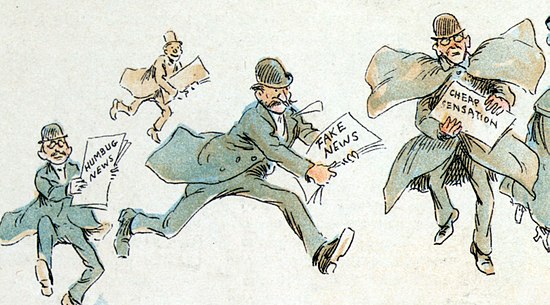199. Truth Amidst Fake News

Fake news can be defined as “a form of news consisting of deliberate disinformation or hoaxes spread via traditional news media (print and broadcast) or online social media” (Wikipedia). Many people are understandably expressing their concern, even panic, over not knowing how to distinguish fake news from news that speaks the truth. Some are even saying that we are being completely manipulated. Could this be true?
Well, there would be no way to identify fake news if we had no access to the truth at all. Seeing something as fake presupposes you grasp what is real to some extent. Of course, the world is full of deceptive sources of information and we may have difficulty ascertaining where the truth lies. But there are good journalists, groundbreaking scientists, and virtuous people who can help us as we, too, make every effort to think rationally, ask for evidence, and ascertain the facts. But how can we discern these legitimate sources from the deceptive ones? Two approaches immediately come to mind:
(1) Use logic and look for contradictions (which are logically and physically impossible), inconsistencies (instances where a set of claims cannot all be true at the same time), and fallacious arguments (those in which the conclusion doesn’t logically follow from the premises).
(2) Take a scientific approach and seek evidence that can be verified through sense experience and corroborated by others.
Perhaps skeptics will object and say that even these tools of inquiry might not, or do not, get us to the truth. But such people, as St. Augustine pointed out in his own attack on the skeptics, have to use logic to formulate their objection. For example, if one speaks a coherent sentence like, “The basic laws of logic are false”, then one has already used the very laws of logic one claims are false. After all, one has constructed a sentence that is meaningful and this entails (1) that the words in the sentence are what they are and not something else which is the law of identity and (2) that the sentence is true and not true and false at the same and in the same respect which is the law of non-contradiction. Moreover, skeptics must offer evidence to justify their claim if they expect anyone to believe they have knowledge. Thus to claim that verifiable evidence and logic might be illusions is self-defeating. And, given the success of science, logic, and mathematics, it is more probable that we do have plenty of truth. After all, if we didn’t have the truth about certain laws of physics, biology and chemistry we would never cure certain diseases, go into outer space, and make successful surgery available. And if our logic and math was illusory we wouldn’t have computers, televisions, and phones upon which to coherently communicate fake news.
Of course, given the amount of disheartening deception around us, these abstract considerations are best taken together with some moral encouragement. Perhaps we can obtain some if we recall Socrates and his efforts to discern the truth amidst the fake news of his day, namely, sophistry. Socrates teaches us to recognize our ignorance, be humble, ask questions, evaluate and present arguments with others, and know that we have the capacity to recollect knowledge from within and think for ourselves. Naturally, sometimes fake news will prevail as it did when Socrates was put to death by the Athenians for corrupting the youth of Athens and teaching false gods…two things he did not do. But his commitment to the truth in the face of wide-spread sophistry improved his own beliefs, inspired those who followed him, and, as he prophesied, still lives on through all truth seekers everywhere:
“And now, O men who have condemned me, I would fain prophesy to you; for I am about to die, and that is the hour in which men are gifted with prophetic power. And I prophesy to you who are my murderers, that immediately after my death punishment far heavier than you have inflicted on me will surely await you. Me you have killed because you wanted to escape the accuser, and not to give an account of your lives. But that will not be as you suppose: far otherwise. For I say that there will be more accusers of you than there are now; accusers whom hitherto I have restrained: and as they are younger they will be more severe with you, and you will be more offended at them. For if you think that by killing men you can avoid the accuser censuring your lives, you are mistaken; that is not a way of escape which is either possible or honorable; the easiest and noblest way is not to be crushing others, but to be improving yourselves. This is the prophecy which I utter before my departure, to the judges who have condemned me.” (Plato’s Apology, 39c, translation by Benjamin Jowett).

Go here for my analysis of Trump and alternative facts.
Go here for my post on Plato’s Good, that source of metaphysical light that allows us to transcend the shadows to some extent.
Go here for my post on sophistry and philosophy.